By Uday Mahurkar
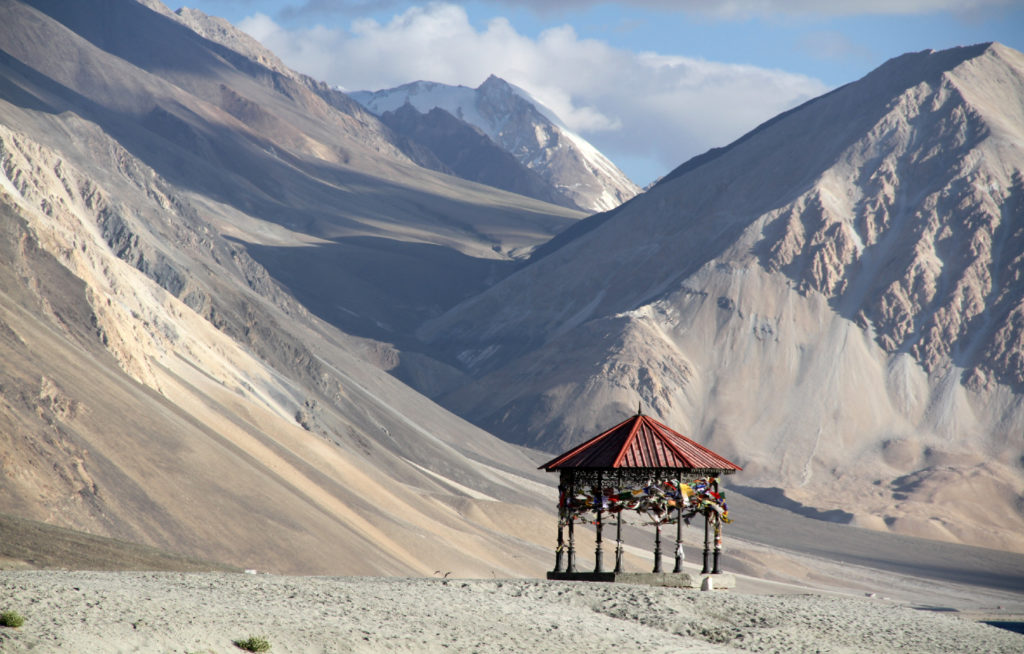
Time for a bold new security doctrine along the lines of the vision of ‘Vir’ Savarkar and Subhash Chandra Bose, and an honest admission that India’s most feted personality, Mohandas Karamchand Gandhi, though internationally acclaimed for his political philosophy, its inherent assumptions of complete non-violence and Hindu-Muslim unity at the cost of the Hindu did much damage to the nation and continues to bedevil it to this day…
There comes a moment in a nation’s course when it needs to accept the stark truth that destiny forces it to look at, howsoever bitter, to end the ongoing afflictions and secure its own future. In other words, no nation can move forward without squarely facing its past mistakes. The nations that fail to do so are bound to be chucked in the wastebin of history without a trace, no matter how great their past glory.
The present trouble at India’s alpine borders calls attention once again to repeated backstabbing from the Chinese, continued terror attacks by Pakistan in the border state of Jammu and Kashmir (J&K), and an internal security situation imperilled by relentless subversive acts of pan-Islamists and communists in concert, as well as political interests intent upon destabilizing the nation. Is it not time for India to do some hard thinking on its past blunders and effect a dramatic shift away from the national security policy hitherto pursued by us?
Perhaps now is the time. The treacherous nature of the Dragon since 1962 is not unfamiliar to India. After Prime Minister Modi assumed the reigns of the country in 2014, there appeared to be some assertive sounds made by India to contain China that brought it from an underdog to an equal footing with the latter. But it allowed itself—yet again—to be lulled into complacence, taken unawares, resulting in the avoidable losses in Galwan valley earlier this month. PM Modi started out making the correct moves by strengthening ties with other powers at odds with China, like Japan and Vietnam, and wooing back countries like Myanmar which appeared to tilt towards the Chinese axis, as also firmly opposing Chinese aggression in the South China Sea and standing with rest of the world to hold China accountable for misinformation leading to the worldwide COVID crisis.
PM Modi’s grand plan to build military and civil infrastructure on the 4,056 km long Indo-China border indicated resolve to firmly counter provocations from Chinese incursions. On the other hand however, restraining the exiled Tibetian religious leader, the Dalai Lama, from being vocal against China betrayed India’s weak spleen and a willingness to appease, an inadequacy clearly not missed by the Chinese as the latest events show. Even as China blocked the bid to have the Pakistani militant and leader of the Islamic terrorist organization Jaish-e-Mohammed (JeM), Maulana Masood Azhar, to be designated a terrorist at the UN Security Council, India failed to successfully play up the issue of continued forcible occupation of Tibet by China and the repressive measures of the Chinese state against Uyghur Muslims in Xinjiang to counter the Chinese stand.
Series of national security blunders
Let’s begin with a throwback into history. The national security blunders by India’s first prime minister, Pt Jahawarlal Nehru, that cost India dearly in the 1962 Indo-China war, was rooted in the pacifist thinking of Mohandas Karamchand Gandhi. Nehru’s ‘Panchsheel’ doctrine for which India paid a heavy price against China was a mixture of Gandhi’s non-violence and his penchant towards leftist ideology. The freedom fighter and a great thinker on Indian nationhood, V. D. Savarkar, had warned in 1954 when Nehru came up with the Panchsheel principle, that such kowtowing to China after its aggression in Tibet would whet the Chinese appetite for swallowing more and more land and that he would not be surprised if China tried the same even against India. The concern he voiced proved prophetic eight years thereafter in 1962.
There are numerous other examples of the dark shadow of Gandhism on India’s national security policy. Around 1978, the Prime Minister of India, Dr Morarji Desai, an upright leader yet a confessed Gandhian, again committed a colossal gaffe revealing to the then Pakistani dictator General Zia-ul Haque, that India had a spy network in Pakistan and that he (Desai) knew about progress of the Pakistan atomic bomb project at Kahuta. Acting immediately on this casual utterance, Zia weeded out all of India’s under-cover operatives set up by a resourceful Indira Gandhi during her tenure as prime minister as part of her successful plan to create a great spy network in Pakistan. Some of them were killed while some others managed to flee. Desai also was incredibly improvident in rejecting an offer from Israel to allow its fighter jets to refuel in India for destroying the Kahuta nuclear facility in Pakistan. Interestingly, until the tenure of Narendra Modi as PM, it was Mrs Indira Gandhi who came closest to evolving a robust national security vision to serve Indian interests strongly. But there were occasions when even Indira Gandhi committed serious errors under the influence of India’s established Gandhian state policies.
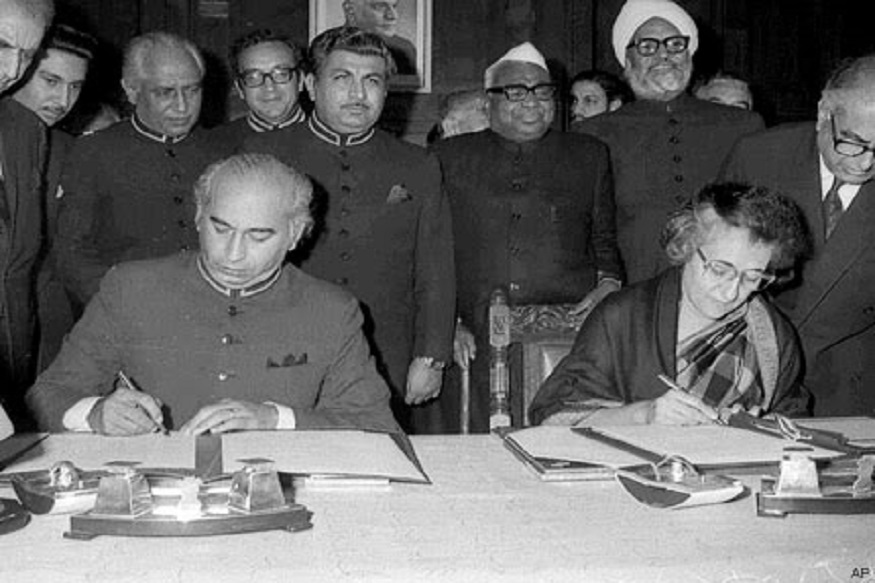
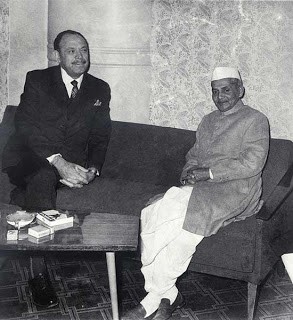
After the breaking of Pakistan into two pieces as a result of the Indo-Pakistan War of 1971, Indira Gandhi failed to successfully settle the issue of Pakistan-occupied-Kashmir (PoK) even while India was holding around 93 thousand Pakistani men as prisoners of war. On the contrary, in the Shimla agreement signed with her counterpart, Zulfikar Ali Bhutto, she surrendered India’s advantage by returning Pakistani territories gained by India in the Sindh region in the ’71 war. Earlier, in the Tashkent Agreement in 1966, the Indian Prime Minister Lal Bahadur Shastri similarly got persuaded into tamely returning the areas won in the 1965 Indo-Pakistan War by India to Pakistan without bargaining for any advantages for India, in spite of the fact that it was the latter that had initiated hostilities.
India’s Gandhian infirmity has had a bearing on the internal security matters too. As many as 10,000 foreign missionaries of the Islamic proselytising movement, Tablighi Jamaat (TJ), were allowed to enter India unhindered since 2014. The Jamaat, though not directly linked to terrorist activities, are known to state security agencies internationally for preaching an exclusive brand of Islam that turns Muslims against the idea of nationhood and its questionable teachings form the cornerstone of joining radical groups. Indian security agencies have had intelligence since several years that TJ is the biggest movement of spreading Islamic zeal in the world spread over 150 countries and forges the vision of ummah (worldwide Islamic brotherhood) a pan-Islamist concept that militates against the idea of nationalism.
Yet it is proof of the dismal lack of vision in issues critical to national security, even while an undoubtedly nationalist government is in power, that not only were over 10,000 foreign missionaries allowed to freely travel through India in the past six months and spread TJ’s activities and teachings inimical to Indian integrity, even after the discovery of this security lapse in the course of the administrative controls carried out in response to the COVID crisis, the Indian government has failed to even detain the leader of the TJ movement in India, Maulana Saad Kandhalvi, for questioning, in spite of the serious nature of charges against him of culpable homicide not amounting to murder.
The ‘Shaheen Bagh movement’ just prior to this which lasted over four months (December 2019 – March 2020) was similarly a mass-mobilisation by Islamists against the Indian state. Ostensibly a protest against the Citizenship Amendment Act (CAA), it had all the indications of a planned attack by violent anti-state insurrectionists and pan-Islamists, apparently seething at the foil to their larger plan of Islamising India, on account of the scrapping of Article 370 by the current Indian ruling dispensation and their huge gains in the Assam and Uttar Pradesh elections, states that are the Islamists’ major ground of activity, as also a reaction to the conclusive judicial resolution of the 350-year old problem of Ram-Janmabhumi Temple in Ayodhya which was perceived as anti-Islam.
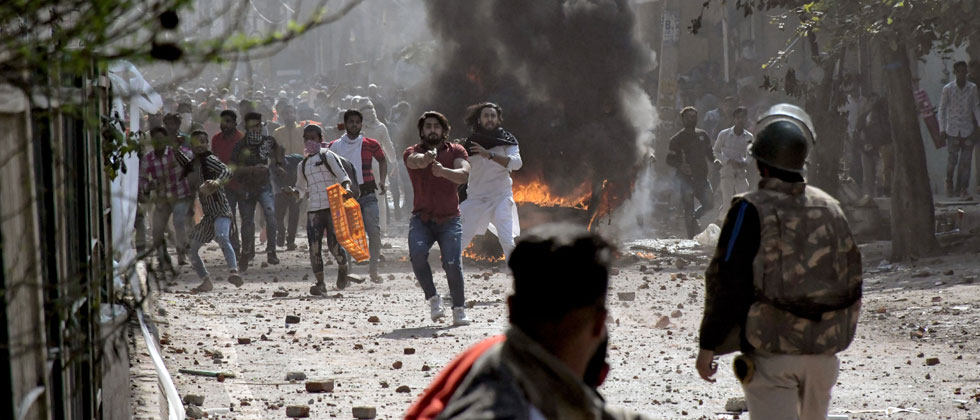
The Central government’s paralysed inaction at such a serious challenge to India’s national integrity boggles the mind, a fatal lapse in law-enforcement which led to the ‘protests’ ultimately spiralling out of hand and culminated in the Delhi Anti-Hindu riots of 2020, during which a pre-planned carnage of Hindus was carried out by rioting Muslim mobs. The Central government’s protracted inaction had apparently been on account of BJP’s sights on the impending Delhi state elections, looking to appease the Muslim electorate rather than firmly dealing with the subversive elements inciting the protests, dwarfing a national security vision before a small state election.
India’s Pakistan policy has been a litany of dismal failures, as that dishonourable terrorist-nation one-fourth the size of India and a minnow in terms of economy has continued to confound India. Pakistan’s military deployment to counter Indian strikes on terrorist camps in Pakistani territory following the 2019 Pulwama attack, should have been met with a strong, small-scale military engagement to permanently neutralize Pakistan’s machinations at the border. Instead, India’s irresolute leadership once again let Pakistan get away, literally allowing it to slip out in spite of having it in a vice grip and a far more superior position militarily and economically. It was the same defeatist Gandhian pacifism which mars all of India’s policies. The result is that the terrorist problem originating in that neighbouring rogue state continues as before. It is almost as if India wanted the status quo to continue instead of decisively ending the terrorist problem!
On the whole India’s national security situation appears far better than it has been in the last 15 years during which it was compromised to the aims and avarice of the political masters. It however remains a fact that, in spite of all its nationalist posturing, the Modi government too has failed to fix a price for Pakistan’s and China’s transgressions, in the determined manner which e.g. Israel does vis-à-vis hostile Muslim nations. Clearly, there is something terribly amiss with India’s security vision and there is an urgent need to fix it both internally and externally.
The greatest impediment: canonical imposition of Gandhian ideology of non-violence
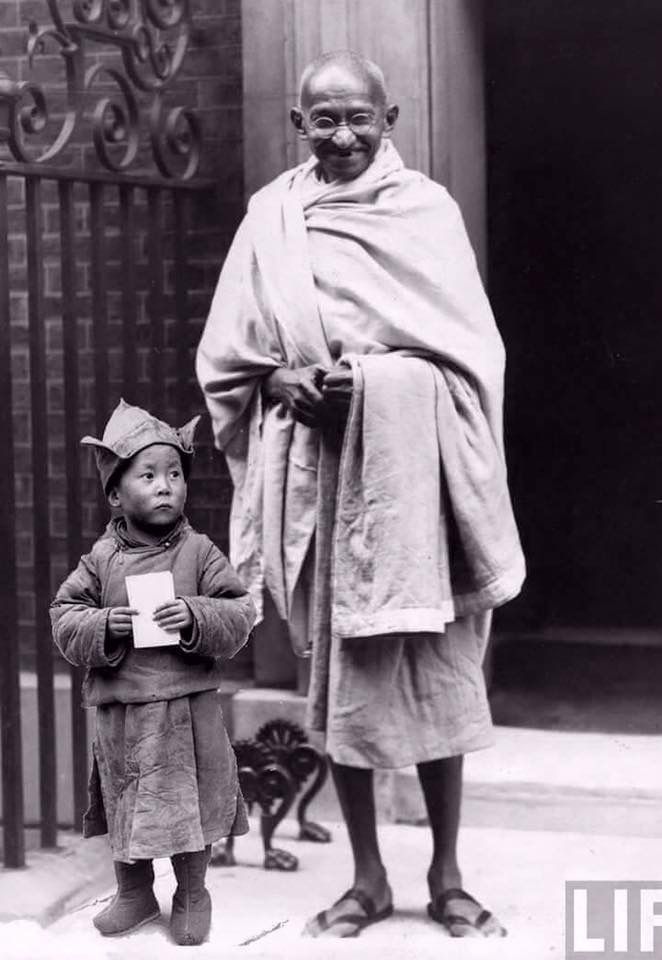
What is the way out? Mohandas Karamchand Gandhi’s novel idea of non-violent resistance was recognised internationally as an ideal policy in a world fraught with imperialist and destructive post-imperialist wars. On the national level, Gandhi’s model of social service and swadeshi, his vision of ‘gram swaraj’ that aimed at making villages self-reliant, and his idea of trusteeship to inspire businessman to contribute towards the progress of poorer sections of the society by apportioning a part of their personally owned wealth for poverty elimination, and his method of assimilation of ‘dalits’ have greatly guided the consciousness of the nation.
It is equally true however that his ideology of complete non-violence and Hindu-Muslim unity at the cost of the Hindu was the direct cause of the partition of India, his capitulations spurring the demands of the Muslim League. Later, in independent India it allowed the pan-Islamist elements to take advantage of his self-mortifying ideology to further their own agenda in the name of various slogans woven around Gandhism. It is not without reason that Gandhi’s picture was ubiquitous at each of the demonstrations from Shaheen Bagh and concomitant anti-government protests across India to those even in foreign countries. Clearly the Gandhian model of appeasement has become a tool for those identifying as minorities to blackmail the majority community with.
Need for debate on Gandhi’s ideology of absolute non-violence and empty slogans for peace
Not many are aware that Gandhi had once suggested, that after getting independence India should dismantle the army and only rely on police for its national security. In 1925, he had shocked many when he said that the historical icons of Hindu fightback, Guru Gobind Singh, Maharana Pratap and Chhatrapati Shivaji, were “misguided patriots”. In the second world war as Germany rained bombs on London, Gandhi’s first statement was that he felt like committing suicide, but later advised England to rely on its “moral force” instead of defending itself militarily. Such quixotic suggestions to an imperilled nation had reportedly greatly incensed the British Prime Minister Winston Churchill.
Clearly, Gandhi’s ideas of extreme pacifism to mollify the adversary has handicapped us in recognising the baleful nature and effective handling of a treacherous foe like China. Except in rare cases, like in the 2019 Balakot air strike, India has rarely followed a tit-for-tat policy, a direct result of Gandhian legacy. If China can capture Indian territory, India would be fully justified in making similar ingressions to gain possession of Chinese territory to secure her position. But for Gandhian idealism by which it would be ‘morally’ wrong! Significantly, Narendra Modi has set new paradigms in diplomacy and security engagement, but in the end few can deny that India’s foreign policy under the present PM too remains hamstrung by Gandhian inhibitions.
US determination in locating and eliminating offenders against its nation contrasted with Indian diffidence
The United States security agencies exacted revenge for 9/11 by relentlessly hunting down and killing Osama Bin Laden 11,000 kms away from their land. India on the other hand is unable to liquidate Hafiz Sayeed and Masood Azhar who are less than 100 kms across our border in spite of having full military capacity to achieve this. When India is challenged on this debility it is justified with homilies like ‘India never committed aggression, but we will not tolerate it when it is thrust upon it’, firmly defining India’s response as diffident-reactive, and not of proactively pushing her interests.
Need to identify fresh icons to exemplify our national security policy
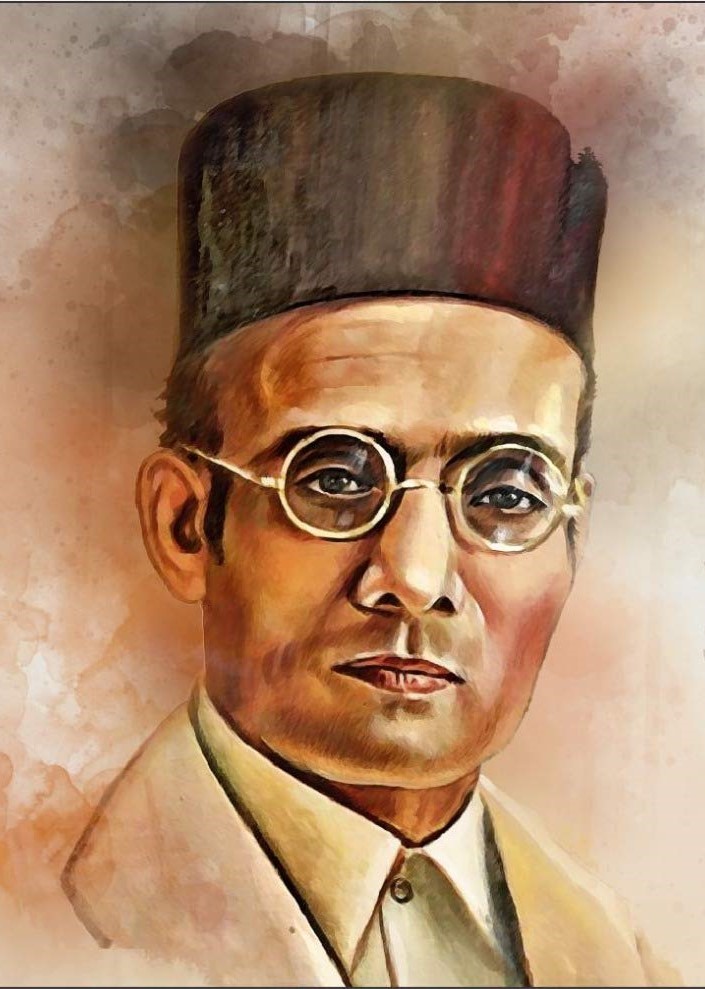
Let us examine the views of another Indian leader contemporary of Gandhi: Vinayak Damodar Savarkar. Savarkar was one of the first leaders to predict many years before the birth of Pakistan that Congress’s policy of Muslim appeasement would become fodder for Muslim League and whet its appetite for special demands at the cost of the Hindu nation. 1937 onwards, after his release from Ratnagiri prison, Savarkar warned the Congress against the repeated concessions made in the face of unreasonable Muslim demands; but for this foresight he was dubbed a ‘communalist’.
He prescience perceived and sounded caution on the adverse impact of demographic change when in 1941 Muslims from the eastern portion of Bengal started settling in Assam in great numbers. Assam’s Muslim population which was at that time just over 10% is 35% today. Similarly, in 1954 he warned that “After China’s attempts to swallow Tibet if Pandit Nehru tries to kowtow to China then the Communist nation’s thirst for swallowing other’s land would get a fillip and he won’t be surprised if China tried to swallow Indian land in future.” The relationship with Pakistan he judged astutely saying that “Till a state based on an intolerant religious foundation was India’s neighbour she would never be able to live in peace.” Instead of acquiescence to British designs recommended by Gandhi, Savarkar advocated an armed strategy for India’s independence during the two World Wars based on sensible realism that “the enemy’s difficulty is our opportunity”. He favoured militarily strengthening India post-independence and acquiring nuclear power for her rise as a superpower. Most of all, he preferred national security over any ideology.
He lay great emphasis on civilisational reassertion and had advised the Jawaharlal Nehru Government at that time that India should rename the Arabian Sea as ‘Sindhu Sagar’. But Nehru’s myopic view closed him to these suggestions vital to India’s strategic interests.
According to his biographer, Dhananjay Keer, Savarkar was one of the first to realise the impact of vital forces in international politics and the necessity to devote attention to foreign propaganda. With the aim to acquaint the civilised world with Indian affairs and to enlist their moral sympathy for the cause of Indian freedom, Savarkar wrote vigorous political articles on Indian affairs in the Gaelic America of New York, got them translated into German, French, Italian, Russian and Portuguese languages and had them published in the respective countries.
Years later, another freedom fighter contemporary with Gandhi, the commander of the Indian National Army (INA) or ‘Azad Hind Fauz’, Subhash Chandra Bose, would take up the thread to muster support from the leaders of Japan and Germany to meet British might. He added recruits to INA from among Indian soldiers captured by Japan and did not fight shy of attacking British India with the aim of freeing India from British yoke.
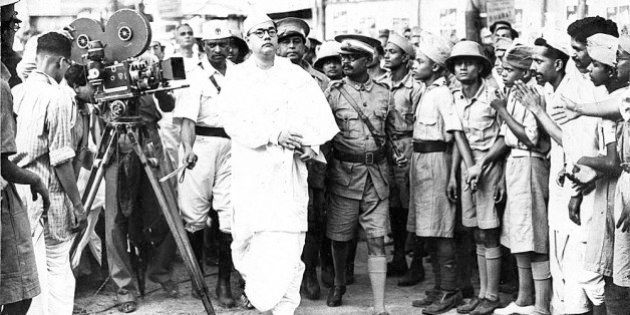
It was this pluck and resourcefulness of Indian freedom fighters that the British feared most, and not the conciliatory approach of Congress, which is revealed in the words of Clement Atlee, the Prime Minister of Britain (1945-1950), who orchestrated the granting of Indian Independence in 1947, in a talk with the acting governor of West Bengal, P. B. Chakraborty, when he stayed as his guest at the Governor’s Palace in Kolkata for two days during his visit to India in 1956. His comments warrant a complete change in the way we have been taught to look at the history of India’s independence struggle:
According to Chakraborty “…Attlee had cited several reasons [for the weakening of British Empire in India and the subsequent relinquishing of control and withdrawal], the most important of which were the activities of Netaji Subhas Chandra Bose which had weakened the very foundations of the attachment of the Indian land and naval forces to the British government.”
(Cited in ‘Subhash Bose, the INA and the War of Indian liberation’ by Ranjan Bora, in Journal of Historical Review’ 1982—Vol. 3)
To a specific question asked by Chakraborty, “What then was the role of Mahatma Gandhi’s Quit India Movement in the grant of India’s Independence?”, Atlee had replied, his face twisted into a sarcastic smile as he spelt out the word, “minimal”.
The time has come for India to rethink her policies in terms of what serves her, instead of the idealistic and self-abnegating ideology of Gandhi, and to adopt a robust national security policy along the lines of political thinkers like Savarkar and Bose who visualised a strong and assertive India that assumes its prerogatives to reclaim its rightful place in the comity of nations.
What will be the impact of such a move?
A formal shift towards such a policy will immediately strip pan-Islamists and sundry subversive agencies like leftist disruptionists of their standard excuse of Gandhism to blackmail the Indian state from acting strongly against them. The ruse to first challenge the majority community with extraordinary acts of violence like in the Godhra incident of 2002, which they do with unerring regularity, and then promptly taking shelter under minority victimhood when faced with retaliation, invoking the unilateral Gandhian injunction on Hindus of absolute non-violence to accuse the beleaguered majority community of ‘violence’, will be rendered ineffectual.
The nationalist orientation rather than Gandhi’s minority-centric view will give more force and direction to state-security measures to identify and ruthlessly eliminate pan-Islamist and other separatist elements undermining the overall national interest.
Delinking Gandhi from our national security plan will send the right signals to the world, especially the world powers and to those that threaten her security, like Pakistan and China. It will alter the perception of the Indian state’s expected pattern of muted reactions, and instead set a standard where overbearing nations learn to fear and respect India’s response to infractions against her interests and security, and know that there will be a steep cost against violations against her physical integrity. It will free Indian policy from the burden of preserving peace even in the face of aggression, to act forcefully and proactively to secure and pursue her strategic advantages.
Though the present dispensation likes to portray an image of being a strong nationalist government, many of its signals are very contradictory which conveys internal confusion in state policy. It tries to play up this image paying lip-service to Hindu nationalism by public displays of reverence to some prominent Hindu nationalist figures. But it is not possible to reconcile Gandhian ideals with the stone cold clear nationalist vision of the likes of Savarkar and Bose. And yet this is exactly the monkey balancing that the BJP appears to be attempting over its last and present tenure. The BJP government has made it a trend to posture loudly at every act of offence against the nation, followed by a completely anticlimactic weak withdrawal compromising the principles it presumes to stand for, and worse, reducing India’s stature by surrendering her prerogative to act, each time.
The time for effecting that paradigm shift in India’s national security policy is now! There is a hole in the Indian ship that needs to be immediately plugged, else the ship might sink.
Cover Picture:
High Mountains near the India-China Border (Source: ‘War on the Rocks’)
Featured image source: ‘iSport Connect’

Sr Journalist and Author
The author is a senior journalist and a nationalist thinker and interpreter of history. He has authored two books on prime minister Narendra Modi’s governance and a series of articles that question the “Lutyens’ Delhi narrative” on key national issues. He can be reached at: uday.mahurkar@gmail.com

Excellent article true and brave